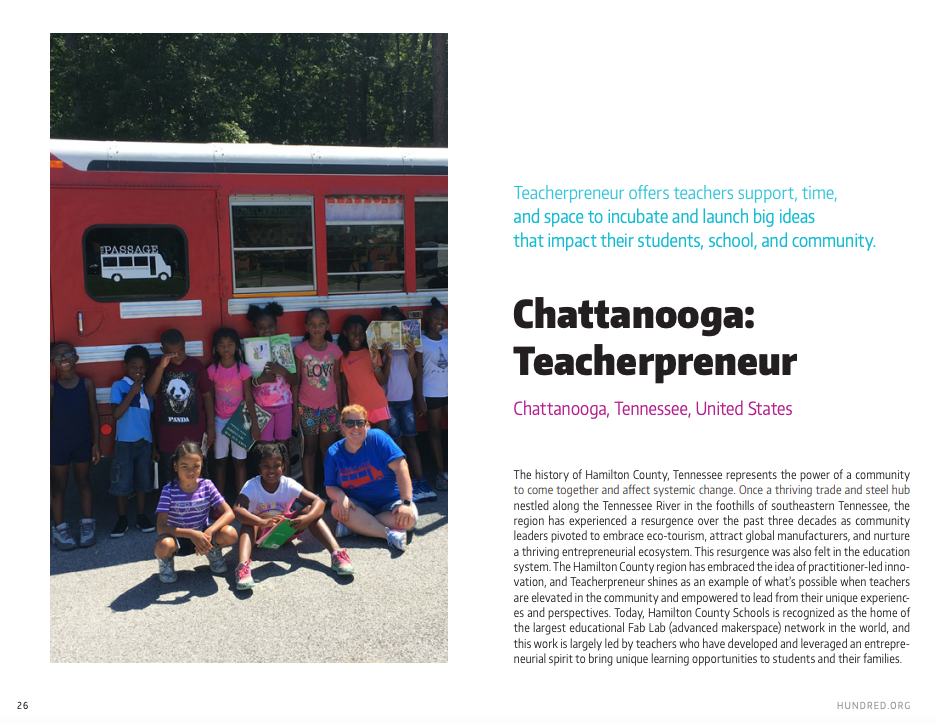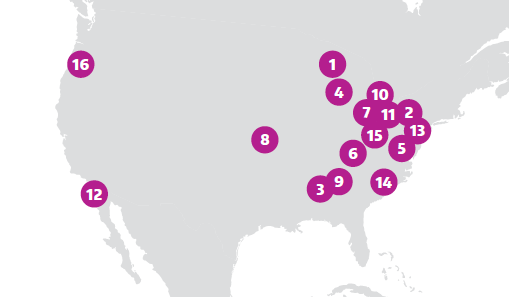Access the HundrED Research Report here:
In the foothills of southeastern Tennessee, something remarkable happens each year on Pitch Night.
Several dozen teachers from Hamilton County schools present proposals they’ve crafted during six weeks of planning sessions. They’ve been encouraged to think like entrepreneurs — taking creative risks and finding uncharted pathways to solve problems. Now it’s time to unveil their proposals.
A panel of expert judges and an audience of more than 300 community members, business leaders and educators listen to their ideas on Pitch Night. With help from a local charitable foundation, the winning ideas are given funding to become reality.
Among the ideas that have surfaced since this innovative program, called Teacherpreneur, began in 2014: Two elementary school teachers retrofitted a school bus to create The Passage. This mobile classroom travels to students’ homes to help their caregivers with the challenge of at-home learning.
Another winning idea is Gig City Girls — a girls-only coding club that has welcomed more than 2,500 students and now includes outposts at 20 schools.
This program was born in Chattanooga. But it could be replicated anywhere. It could be done on a smaller scale or a larger one, and it could be used to tackle any issues that a community wishes to prioritize.
Teacherpreneur is just one of 16 innovations from across the United States that are highlighted in a new report called Learning Forerunners Across America, released this week by the global innovation organization HundrED, along with the Pittsburgh-based Remake Learning network and the Grable Foundation.

These innovations were chosen for the report because they focus on big-picture, system-level, impactful solutions at scale that are successfully operating across multiple schools and/or institutions.
HundrED has been searching for groundbreaking, scalable ideas like these and sharing them globally since 2016. Through a series of Spotlight reports on notable innovations happening in places like Pittsburgh, HundrED shares ideas that can help policymakers, businesses and families to improve learning in their communities.
This new report has been released at an especially powerful moment. The COVID-19 disruption of schooling has presented tremendous challenges, while opening up unique opportunities for communities to enact swift, impactful change for the benefit of all learners.
Even for those at the forefront of learning innovation, 2020 has been a year of stunning change. Just six months ago, the 16 organizations highlighted in this report were poised to demonstrate their innovative work during more than 1000 public, hands-on learning events last spring as part of the Remake Learning Days Across America (RLDAA) festival.

Launched in 2016 as the world’s largest open house for the future of teaching and learning, the 2020 RLDAA was planned to be even larger than any before it. And then, of course, came COVID. Just as the spring dates for the festival approached, holding public, multi-generational, hands-on learning events across communities suddenly became a risk.
But as challenging as it’s been to have events like this postponed until next year, the virus-fueled school disruption has also created a malleable moment for change.
“There may not be another moment in our lifetimes when educators are thinking as boldly about what education and learning might be than right now. We should embrace these innovations as signals about what’s possible,” said Gregg Behr, executive director of the Grable Foundation and co-chair of Remake Learning.
“If we introduce these possibilities to parents, and we genuinely involve families as learning allies alongside our students and teachers,” Behr says, “then we just might actually remake learning for years to come. That’s what is so electrifying about what’s happening right here in Pittsburgh and throughout the 16 Remake Learning Days regions.”
Districts are rethinking longstanding systems of teaching and assessing student progress. Teachers are innovating because they have to, and they’re sharing ideas and best practices with one another, and communities are racing to improve teacher professional development. And districts are sorting through the possibilities and downfalls of digital learning to find the best path forward.
The virus-fueled school disruption has also greatly increased parental involvement in learning — something the Global Family Research Project has found to be truly valuable through data gathered during past Remake Learning Days Across America festivals.
Since its launch in 2016, Remake Learning Days festivals have given parents, caregivers and students an up-close look at the latest learning innovations, inviting them to experience those innovations themselves. Along the way, parents discover places and programs where they can learn with their children. Hopefully, demand for those programs then grows.
But the festival, like the Learning Forerunners report, also serves to spread the word about these innovative programs beyond the borders of the communities where they’ve been created.

“We envision a sharing of best innovations between countries, states, cities, or school networks that have a mission to help every child flourish,” says the report, which will be unveiled on Oct. 13 at 7 p.m. ET during a live online event launching a year-long celebration of the next Remake Learning Days Across America festival.
Dorie Taylor, producer of RLDAA, hopes that launch event (available for viewing here) “can help parents, caregivers and educators across all communities get inspired by the learning kids are doing alongside their caring adults, and think about what they hope to see in their own communities.”
In April and May next year, Remake Learning Days events will be happening throughout the U.S. Depending on the progress of the country’s battle with COVID-19, in-person hands-on arts, maker, outdoor, science, technology, and youth-voice themed learning events will be held nationwide. They’ll happen in California, Oregon, Wisconsin, Tennessee, North Carolina, Washington D.C. and many points in between. Events include four separate festivals planned for southeastern, central and southwestern Pennsylvania, as well as West Virginia.
And if public, hands-on learning isn’t possible, a slew of virtual events will showcase hundreds of learning opportunities.
As the Learning Forerunners report points out, these publicly showcased innovations “will help set the stage for a global ecosystem: one in which innovators around the world learn from one another, share promising practices, and help every child flourish on this planet that connects us all.”
This article is part of a series for Tomorrow, powered by Remake Learning. From May to October 2020, Tomorrow will explore–through virtual events, grantmaking and extensive storytelling–what we can do today to make tomorrow a more promising place for all learners. Have something to add? Share your hopes for today’s young people using #RemakeTomorrow and tagging @RemakeLearning. Tomorrow will elevate community questions, spotlight your ideas and help all of us prepare for whatever the future may bring.
